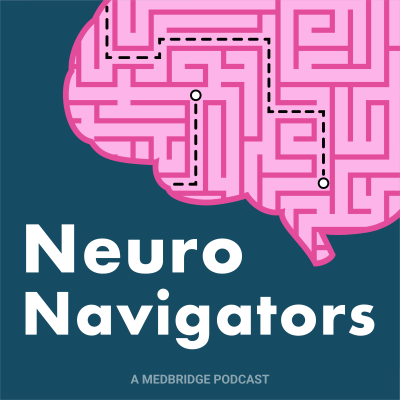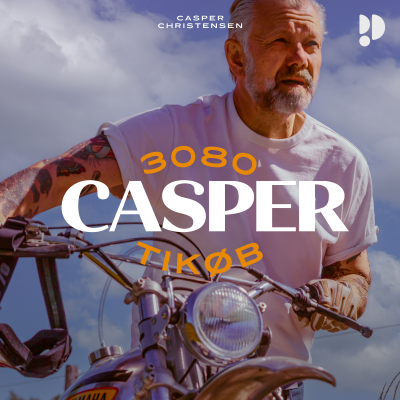
Neuro Navigators: A Medbridge Podcast
Podcast af Medbridge
Denne podcast er gratis at lytte på alle podcastafspillere og Podimo-appen uden abonnement.
Alle episoder
10 episoderDr. Herbert Karpatkin, PT, DSc, NCS, GCS, MSCS [https://www.medbridge.com/about/instructor/herb-karpatkin-pt-dsc], joins J.J. Mowder-Tinney [https://www.medbridge.com/about/instructor/jj-mowder-tinney-physical-therapy] to share his expertise on improving mobility in patients with multiple sclerosis (MS). Herb discusses the common misconceptions about MS in physical therapy and offers practical strategies, including interval training and task-specific exercises, to enhance patient outcomes. Learning Objectives * Interpret the evidence around how to improve mobility and exercise tolerance in people with MS * Apply evidence-based, practical strategies to actionably address fatigue to increase exercise intensity for people with MS * Solve patient case scenarios involving MS focusing on exercise, rest, and functional outcomes Timestamps * (00:00:00) Welcome * (00:00:58) Introduction to guest * (00:03:33) Is there anything we should be questioning as clinicians in regard to people with MS? * (00:08:05) What’s the evidence and application? * (00:16:50) Translating research into clinical practice * (00:26:21) Fatigue measures and scales * (00:36:21) Three actionable takeaways * (00:45:00) Final words of wisdom Neuro Navigators is brought to you by Medbridge. If you’d like to earn continuing education credit for listening to this episode and access bonus takeaway handouts, log in to your Medbridge account and navigate to the course where you’ll find accreditation details. If applicable, complete the post-course assessment and survey to be eligible for credit. The takeaway handout on Medbridge gives you the key points mentioned in this episode, along with additional resources you can implement into your practice right away. To hear more episodes of Neuro Navigators, visit https://www.medbridge.com/neuro-navigators [https://www.medbridge.com/neuro-navigators] If you’d like to subscribe to Medbridge, visit https://www.medbridge.com/pricing/ [https://www.medbridgeeducation.com/pricing/]
Dr. Darcy Reisman [https://www.medbridge.com/about/instructor/darcy-reisman], professor and chairperson of the department of physical therapy at the University of Delaware, joins host J.J. Mowder-Tinney [https://www.medbridge.com/about/instructor/jj-mowder-tinney-physical-therapy] for an engaging discussion on poststroke rehabilitation, with a focus on walking recovery. A true knowledge translator, Dr. Reisman shares her extensive research and outlines practical strategies for improving both clinical walking capacity and real-world walking performance. Tune in to discover how bridging the gap between research, therapy, and real life can help your patients achieve their walking goals both in and beyond the clinic. Learning Objectives * Interpret the evidence surrounding walking capacity vs. walking performance after stroke * Apply evidence-based strategies to enhance walking recovery in poststroke patients * Incorporate motivational interviewing-type techniques and patient-centered goal setting in stroke rehabilitation Timestamps * (00:00:00) Welcome * (00:00:29) Introduction to guest * (00:01:30) Background and research focus * (00:04:49) Understanding walking capacity vs. performance after stroke * (00:09:42) Research findings on capacity and performance interventions * (00:12:50) Behavioral interventions in stroke rehabilitation * (00:16:11) Step activity monitoring behavioral intervention explained * (00:19:30) Setting realistic goals for patients * (00:22:52) The importance of specificity in rehabilitation goals * (00:25:40) Motivational interviewing type techniques for patient engagement * (00:30:45) Integrating heart rate monitoring in therapy * (00:34:28) High-intensity training and its impact on recovery * (00:39:17) Empowering patients as athletes in their recovery * (00:43:04) Case study: Applying research to practice * (00:51:42) Final thoughts and words of wisdom Resources Mentioned in Episode * PROWALKS Study [https://www.ahajournals.org/doi/10.1161/STROKEAHA.123.044596] Neuro Navigators is brought to you by Medbridge. If you’d like to earn continuing education credit for listening to this episode and access bonus takeaway handouts, log in to your Medbridge account and navigate to the course where you’ll find accreditation details. If applicable, complete the post-course assessment and survey to be eligible for credit. The takeaway handout on Medbridge gives you the key points mentioned in this episode, along with additional resources you can implement into your practice right away. To hear more episodes of Neuro Navigators, visit https://www.medbridge.com/neuro-navigators [https://www.medbridge.com/neuro-navigators] If you’d like to subscribe to Medbridge, visit https://www.medbridge.com/pricing/ [https://www.medbridgeeducation.com/pricing/]
Dr. Carole Lewis [https://www.medbridge.com/about/instructor/carole-lewis], an esteemed expert in geriatric rehabilitation, joins host J.J. Mowder-Tinney [https://www.medbridge.com/about/instructor/jj-mowder-tinney-physical-therapy] to discuss practical pearls for managing frailty, deconditioning, and sarcopenia in older adults. Drawing on Dr. Lewis’s extensive clinical experience and research, this episode is jam-packed with key outcome measures, targeted interventions, and strategies to empower your patients toward greater independence. Listen and learn from a conversation centered around bringing hope and skill to a population that too many people overlook and underestimate. Learning Objectives * Interpret the evidence around older adults with sarcopenia, deconditioning, and frailty * Apply evidence-based, practical strategies to facilitate improved participation in daily activities for older adults with sarcopenia, deconditioning, and frailty * Solve patient case scenarios involving older adults with sarcopenia, deconditioning, and frailty Timestamps * (00:00:00) Introduction and Overview * (00:09:00) The Clinical Challenge of Working With Frail and Deconditioned Patients * (00:13:20) Assessing Frailty, Deconditioning, and Sarcopenia * (00:18:24) Practical Tools for Assessing Frailty, Deconditioning, and Sarcopenia * (00:27:31) Documenting and Communicating the Presence of Frailty, Deconditioning, and Sarcopenia * (00:30:22) Intervention Strategies * (00:50:15) Top Takeaways * (00:51:30) Case Study * (00:55:50) Final Words of Wisdom Neuro Navigators is brought to you by Medbridge. If you’d like to earn continuing education credit for listening to this episode and access bonus takeaway handouts, log in to your Medbridge account and navigate to the course where you’ll find accreditation details. If applicable, complete the post-course assessment and survey to be eligible for credit. The takeaway handout on Medbridge gives you the key points mentioned in this episode, along with additional resources you can implement into your practice right away. To hear more episodes of Neuro Navigators, visit https://www.medbridge.com/neuro-navigators [https://www.medbridge.com/neuro-navigators] If you’d like to subscribe to Medbridge, visit https://www.medbridge.com/pricing/ [https://www.medbridgeeducation.com/pricing/]
Join host J.J. Mowder-Tinney [https://www.medbridge.com/about/instructor/jj-mowder-tinney-physical-therapy] as she welcomes occupational therapist Melissa Kimmerling [https://www.medbridge.com/about/instructor/melissa-kimmerling], an expert in neurorehabilitation. In this episode, J.J. and Melissa dive deep into the intricacies of cueing strategies, exploring recent research and practical applications for clinicians. Discover actionable insights and innovative approaches to enhance your clinical practice. Learning Objectives * Interpret the evidence around effective cueing strategies for clients with neurological impairments * Apply evidence-based, practical strategies to actionably address cognitive impairments in practice * Solve patient case scenarios involving choosing the best cueing strategy for a provided client case Timestamps * (00:00:00) Welcome * (00:00:49) Introduction to guest * (00:05:54) Why this clinical question? * (00:18:21) What’s the evidence and application? * (00:31:11) Translating evidence into the clinic * (00:42:56) Three main takeaways * (00:45:55) Case example Neuro Navigators is brought to you by MedBridge. If you’d like to earn continuing education credit for listening to this episode and access bonus takeaway handouts, log in to your MedBridge account and navigate to the course where you’ll find accreditation details. If applicable, complete the post-course assessment and survey to be eligible for credit. The takeaway handout on MedBridge gives you the key points mentioned in this episode, along with additional resources you can implement into your practice right away. To hear more episodes of Neuro Navigators, visit https://www.medbridge.com/neuro-navigators [https://www.medbridge.com/neuro-navigators] If you’d like to subscribe to MedBridge, visit https://www.medbridge.com/pricing/ [https://www.medbridgeeducation.com/pricing/]
Join us for an enlightening conversation with Rebecca Bliss [https://www.medbridge.com/about/instructor/rebecca-bliss], an expert in concussion management across the lifespan. J.J. Mowder-Tinney [https://www.medbridge.com/about/instructor/jj-mowder-tinney-physical-therapy] engages Becky in a deep dive into recent research and practical tips, including the importance of incorporating functional assessment of symptomatology, principles of neuroplasticity, and early active rehabilitation into patient care. Discover key insights and techniques to enhance your concussion management practices, whether working with tactical athletes or older adults. Timestamps * (00:00:00) Welcome * (00:01:03) Introduction to guest * (00:06:29) Importance of discussing approaches to concussion management * (00:10:14) History and use of the Concussion Clinical Profile Screening Tool (CCPST) * (00:20:58) Consensus statements and guidelines for concussion management * (00:33:00) Applying principles of neuroplasticity in rehabilitation * (00:43:00) Actionable takeaways * (00:47:08) Case scenario * (00:56:50) Final thoughts Learning Objectives * Interpret the evidence related to active rehabilitation strategies to optimize outcomes for patients with concussive injury * Apply evidence-based, practical strategies to actionably address clinical trajectories following concussion injury * Solve patient case scenarios involving protracted symptoms following concussion Resources Mentioned in Episode * Concussion Clinical Profiles Screening (CP Screen) Tool [https://pubmed.ncbi.nlm.nih.gov/31950187/] * Experienced Clinical Decision-Making in Physical Therapist Management of Concussion: A Qualitative Study [https://pubmed.ncbi.nlm.nih.gov/38386996/] * University of Missouri: Concussion Care ECHO [https://pubmed.ncbi.nlm.nih.gov/38386996/] Neuro Navigators is brought to you by MedBridge. If you’d like to earn continuing education credit for listening to this episode and access bonus takeaway handouts, log in to your MedBridge account and navigate to the course where you’ll find accreditation details. If applicable, complete the post-course assessment and survey to be eligible for credit. The takeaway handout on MedBridge gives you the key points mentioned in this episode, along with additional resources you can implement into your practice right away. To hear more episodes of Neuro Navigators, visit https://www.medbridge.com/neuro-navigators [https://www.medbridge.com/neuro-navigators] If you’d like to subscribe to MedBridge, visit https://www.medbridge.com/pricing/ [https://www.medbridgeeducation.com/pricing/]
Tilgængelig overalt
Lyt til Podimo på din telefon, tablet, computer eller i bilen!
Et univers af underholdning på lyd
Tusindvis af lydbøger og eksklusive podcasts
Ingen reklamer
Spild ikke tiden på at lytte til reklamepauser, når du lytter til Podimos indhold.



















